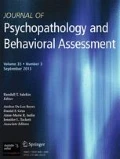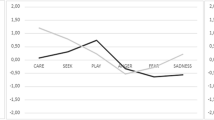Abstract
The Sociotropy-Autonomy Scale (SAS) was developed as a means of assessing two cognitive-personality constructs postulated as vulnerability factors in depression (Beck, 1983). While studies have confirmed the validity of the SAS Sociotropy Scale, the construct validity of the Autonomy Scale has not been well supported. The present study was conducted to improve on the measurement of autonomy by generating additional items which were added to the original questionnaire. This 93-item SAS was administered to 485 undergraduates along with the Beck Depression Inventory, Beck Anxiety Inventory, PRF Affiliation and Autonomy Scales, Positive and Negative Emotionality Measures, and Marlowe-Crowne Social Desirability Scale. Four factors labeled Sociotropy, Solitude/Interpersonal Insensitivity, Independence, and Individualistic Achievement emerged from a principal-factor analysis of the SAS item pool. Hierarchical multiple regression analyses indicated that positive emotionality and solitude/interpersonal insensitivity were specifically related to dysphoria, while negative emotionality and sociotropy had significant associations with both anxious and depressed mood states.
Similar content being viewed by others
References
Arieti, S., & Bemporad, J. R. (1980). The psychological organization of depression.American Journal of Psychiatry, 137, 1360–1365.
Barnett, P. A., & Gotlib, I. H. (1988).Personality and depression: New scales and a model of relationships. Paper presented at the Annual Meeting of the Canadian Psychological Association, Montreal.
Beck, A. T. (1983). Cognitive therapy of depression: New perspectives. In P. J. Clayton & J. E. Barrett (Eds.),Treatment of depression: Old controversies and new approaches. New York: Raven Press.
Beck, A. T. (1987). Cognitive model of depression.Journal of Cognitive Psychotherapy, 1, 2–27.
Beck, A. T., & Epstein, N. (1982).Cognitions, attitudes and personality dimensions in depression. Paper presented at the Annual Meeting of the Society for Psychotherapy Research, Smugglers Notch, VT.
Beck, A. T., Epstein, N., Harrison, R. P., & Emery, G. (1983).Development of the Sociotropy-Autonomy Scale: A measure of personality factors in psychopathology, Unpublished manuscript, Philadelphia: Center for Cognitive Therapy, University of Pennsylvania Medical School.
Beck, A. T., Epstein, N., Brown, G., & Steer, R. A. (1988). An inventory for measuring clinical anxiety: Psychometric properties.Journal of Consulting and Clinical Psychology, 56, 893–897.
Beck, A. T., Steer, R. A., & Garbin, M. G. (1988). Psychometric properties of the Beck Depression Inventory: Twenty-five years of evaluation.Clinical Psychology Review, 8, 77–100.
Blaney, P. H., & Kutcher, G. S. (1991). Measures of depressive dimensions: Are they interchangeable?Journal of Personality Assessment, 56, 502–512.
Blatt, S. J. (1974). Levels of object representation in anaclitic and introjective depression.Psychoanalytic Study of the Child, 29, 107–157.
Blatt, S. J., Quinlan, D. M., Chrevon, E. S., McDonald, C., & Zuroff, D. (1982). Dependency and self-criticism: Psychological dimensions of depression.Journal of Consulting and Clinical Psychology, 50, 113–124.
Bumberry, W., Oliver, J. M., & McClure, J. N. (1978). Validation of the Beck Depression Inventory in a university population using psychiatric estimate as the criterion.Journal of Consulting and Clinical Psychology, 46, 150–155.
Chodoff, P. (1972). The depressive personality: A critical review.Archives of General Psychiatry, 27, 666–673.
Clark, D. A., Beck, A. T., & Stewart, B. (1990). Cognitive specificity and positive-negative affectivity: Complementary or contradictory views on anxiety and depression?Journal of Abnormal Psychology, 99, 148–155.
Clark, D. A., Beck, A. T., & Brown, G. K. (in press). Sociotropy, autonomy and life event perceptions in dysphoric and nondysphoric individuals.Cognitive Therapy and Research.
Clark, L. A., & Watson, D. (1991). A tripartite model of anxiety and depression: Psychometric evidence and taxonomic implications.Journal of Abnormal Psychology, 100, 316–336.
Crowne, D. P., & Marlowe, D. (1960). A new scale of social desirability independent of psychopathology.Journal of Consulting Psychology, 24, 355–360.
Dent, H. R., & Salkovskis, P. M. (1986). Clinical measures of depression, anxiety and obsessionality in non-clinical populations.Behaviour Research and Therapy, 24, 689–691.
Gilbert, P., & Reynolds, S. (1990). The relationship between the Eysenck Personality Questionnaire and Beck's concepts of sociotropy and autonomy.British Journal of Clinical Psychology, 29, 319–325.
Hammen, C., Ellicott, A., & Gitlin, M. (1989). Vulnerability to specific life events and prediction of course of disorder in unipolar depressed patients.Canadian Journal of Behavioral Science, 21, 377–388.
Hammen, C., Ellicott, A., Gitlin, M., & Jamison, K. R. (1989). Sociotropy/autonomy and vulnerability to specific life events in patients with unipolar depression and bipolar depression.Journal of Abnormal Psychology, 98, 154–160.
Hirschfeld, R. M., Klerman, G. L., Clayton, P. J., & Keller, M. B. (1983). Personality and depression: Empirical findings.Archives of General Psychiatry, 40, 993–998.
Hirschfeld, R. M., Klerman, G. L., Clayton, P. J., Keller, M. B., McDonald-Scott, P., & Larkin, B. H. (1983). Assessing personality: Effects of the depressive state on trait measurement.American Journal of Psychiatry, 140, 695–699.
Hirschfeld, R. M., Klerman, G. L., Lavori, P., Keller, M. B., Griffith, P., & Coryell, W. (1989). Premorbid personality assessments of first onset of major depression.Archives of General Psychiatry, 46, 345–350.
Jackson, D. N. (1984).Manual of the Personality Research Form. Port Huron, MI: Research Psychologist's Press.
Klein, D. N., Harding, K., Taylor, E. B., & Dickstein, S. (1988). Dependency and self-criticism in depression: Evaluation in a clinical population.Journal of Abnormal Psychology, 97, 399–404.
Kline, P., & Barrett, P. (1983). The factors in personality questionnaires among normal subjects.Advances in Behaviour Research and Therapy, 5, 141–202.
Overholser, J. C., Kabakoff, R., & Norman, W. H. (1989). The assessment of personality characteristics in depressed and dependent psychiatric inpatients.Journal of Personality Assessment, 53, 40–50.
Philon, D. J. (1989).The Sociotropy-Autonomy Scale in a university population: An overview. Paper presented at the World Congress of Cognitive Therapy, Oxford, England.
Reich, J., Noyes, R., Hirschfeld, R., Coryell, W., & O'Gorman, T. (1987). State and personality in depressed and panic patients.American Journal of Psychiatry, 144, 181–187.
Reynolds, S., & Gilbert, G. (1991). Psychological impact of unemployment: Interactive effects of vulnerability and protective factors in depression.Journal of Counseling Psychology, 38, 76–84.
Robins, C. J. (1985).Construct validation of the Sociotropy-Autonomy Scale: A measure of vulnerability to depression. Paper presented at the Annual Meeting of the Eastern Psychological Association, Boston.
Robins, C. J., & Block, P. (1988). Personal vulnerability, life events, and depressive symptoms: A test of a specific interactional model.Journal of Personality and Social Psychology, 54, 847–852.
Segal, Z. V., Shaw, B. F., & Vella, D. D. (1989). Life stress and depression: A test of the congruency hypothesis for life event content and depressive subtype.Canadian Journal of Behavioral Science, 21, 389–400.
Sutter, E. M., & Epstein, N. (1983).Cognitive themes of depression, Unpublished manuscript. Philadelphia: Center for Cognitive Therapy, University of Pennsylvania Medical School.
Tanaka-Matsumi, J., & Kameoka, V. A. (1986). Reliabilities and concurrent validities of popular self-report measures of depression, anxiety, and social desirability.Journal of Consulting and Clinical Psychology, 54, 328–333.
Tellegen, A. (1989).Multidimensional Personality Questionnaire. Minneapolis: University of Minnesota Press.
Watson, D. (1988). Intraindividual and interindividual analyses of positive and negative affect: Their relation to health complaints, perceived stress, and daily mood.Journal of Personality and Social Psychology, 54, 1020–1030.
Watson, D., & Clark, L. A. (1984). Negative affectivity: The disposition to experience aversive emotional states.Psychological Bulletin, 96, 465–490.
Watson, D., & Pennebaker, J. W. (1989). Health complaints, stress, and distress: Exploring the central role of negative affectivity.Psychological Review, 96, 234–254.
Watson, D., & Tellegen, A. (1985). Toward a consensual structure of mood.Psychological Bulletin, 98, 219–235.
Watson, D., Clark, L. A., & Carey, G. (1988). Positive and negative affectivity and their relation to anxiety and depressive disorders.Journal of Abnormal Psychology, 97, 346–353.
Author information
Authors and Affiliations
Additional information
This research was supported by University of New Brunswick Research Grant 22–51 awarded to the first author.
Rights and permissions
About this article
Cite this article
Clark, D.A., Beck, A.T. Personality factors in dysphoria: A psychometric refinement of beck's Sociotropy-Autonomy Scale. J Psychopathol Behav Assess 13, 369–388 (1991). https://doi.org/10.1007/BF00960448
Accepted:
Issue Date:
DOI: https://doi.org/10.1007/BF00960448



